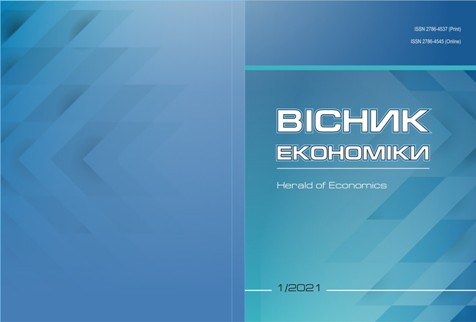Technological anthropocentrism in accounting for Industry 5.0
DOI:
https://doi.org/10.35774/visnyk2024.04.201Keywords:
accounting, anthropocentrism, artificial intelligence, Industry 5.0, agency theory, institutionalism, behaviorism, accounting digitalizationAbstract
Introduction. The emergence of the Fifth Industrial Revolution emphasizes technological anthropocentrism as a concept for managing enterprises based on accounting information and leveraging advanced computer-communication technologies. Industry 5.0 focuses particularly on the critical role of modern computer-communication technologies in realizing anthropocentric priorities within the societal framework, particularly in the financial and economic activities of enterprises.
The purpose of the article is to position the anthropocentric concept of enterprise management based on accounting information as an informational component of Industry 5.0, utilizing state-of-the-art computer-communication technologies.
Methods. The study of accounting transformation prospects in the context of Industry 5.0 employed general scientific empirical, logical, and historical methods of cognition. The research is based on general methods of analyzing economic processes, facts, and phenomena from the perspectives of accounting and computer technologies.
Results. It is substantiated that technological anthropocentrism is becoming a key concept in enterprise management, grounded in the implementation of opportunism, behaviorism, agency theory, and institutionalism. The main directions for implementing anthropocentrism in Industry 5.0 accounting include adherence to robotics laws, optimization of working time, stimulation of creativity, professional development, and meeting stakeholders’ informational needs. It is noted that technological anthropocentrism contributes to mitigating informational, reputational, and socio-economic risks while supporting the socio-economic interests of society, professionals, and state institutions.
Prospects. The process of establishing technological anthropocentrism is ongoing and multifaceted, highlighting new aspects of accounting transformation in the context of the development of innovative computer-communication technologies. This necessitates further research in the realm of Industry 5.0.
References
Plašienková, Zlatica, Smolková, Eva. (2024). In Defence of Environmental Anthropocentrism. Studia Ecologiae et Bioethicae, 22. Retrieved from http://doi. org/10.21697/seb.5816. [in English].
Samways, David. (2024). The anthropocentrism thesis: (mis)interpreting environmental values in small-scale societies. Environmental Values. Retrieved from http://doi.org/10.1177/09632719241245170. [in English].
Sikandar Syed Muhammad, Ali Syed, Hassan Zameer. (2024). Harmonizing smart city tech and anthropocentrism for climate resilience and Nature’s benefit. Social Sciences & Humanities Open, 10, 101026. Retrieved from http://doi.org/10.1016/j. ssaho.2024.101026. [in English].
Kotsur Vitalii, Bobina Oleg, Shapovalova Iryna, Vorchakova Iryna, Sugatska Nataliia. (2024). People-centeredness in the context of sustainable development of the country: Issues of cultural policy and ensuring intellectual security. Edelweiss Applied Science and Technology, 8, 591–599. Retrieved from http://doi. org/10.55214/25768484.v8i6.2131. [in English].
Rae Gavin. (2013). Heidegger’s influence on posthumanism: The destruction of metaphysics, technology and the overcoming of anthropocentrism. History of the Human Sciences, 27, 51–69. Retrieved from http://doi. org/10.1177/0952695113500973. [in English].
Dmytrenko, H., Holovach, N. (2021). Liudynotsentrychna sutnist ekonomichnoho rozvytku [The human-centric essence of economic development]. Ekonomika ta suspilstvo – Economy and society, (29). Retrieved from https://doi. org/10.32782/2524-0072/2021-29-8. [in Ukrainian].
Bakulina, O. S. (2019). Formuvannia liudynotsentrychnoi modeli sotsialnoho rozvytku pidpryiemstv [Formation of a human-centered model of social development of enterprises]. Skhidna Yevropa: ekonomika, biznes ta upravlinnia – Eastern Europe: economy, business and management, 2 (19), 99–103. Retrieved from https://www.easterneurope-ebm.in.ua/journal/19_2019/16.pdf. [in Ukrainian].
Zghalat-Lozynska, L. O. (2019). Metodolohichni ta sotsialno-tekhnolohichni zasady innovatsiinoi diialnosti orhanizatsii: liudynotsentrychnyi kontekst [Methodological and socio-technological foundations of innovative activities of organizations: a human-centric context]. Prychornomorski ekonomichni studii – Black Sea Economic Studies, 48–3, 27–34. Retrieved from https://doi.org/10.32843/bses.48-69. [in Ukrainian].
Shakhno, A. Yu., Paustovska, T. I., Kravchuk, L. M., Lashkun, H. A. (2021). Liudynotsentrychna skladova innovatsiino-investytsiinoho rozvytku hirnychodobuvnoho rehionu [Human-centric component of innovation and investment development of the mining region]. Ekonomika ta derzhava – Economy and State, 8, 37–41. Retrieved from https://doi.org/10.32702/2306-6806.2021.8.37. [in Ukrainian].
Holovach, N.V., Dmytrenko, H.A. (2019). Pidvyshchennia yakosti trudovoho potentsialu orhanizatsii z vrakhuvanniam potreb robotodavtsia ta pratsivnyka [Improving the quality of labor potential of organizations taking into account the needs of the employer and employee]. Vcheni zapysky TNU imeni V.I. Vernadskoho. Seriia: Ekonomika i upravlinnia – Scientific notes of the V.I. Vernadsky TNU. Series: Economics and Management, 30 (69), 6, 43–48. Retrieved from https://doi. org/10.32838/2523-4803/69-6-30. [in Ukrainian].
Gatt, Lucilla. (2022). Legal anthropocentrism between nature and technology: the new vulnerability of human beings.. European Journal of Privacy Law & Technologies. 15. Retrieved from https://doi.org/10.57230/ejplt221LG. [in English].
Muravskyi, V. (2023). Oblik ta kiberbezpeka: monohr. [Accounting and cybersecurity: monogr.]. Ternopil : WUNU. 2023. 200 p. [in Ukrainian].
Azimov, Aizek. (2005). Zarubizhni pysmennyky: entsyklopedychnyi dovidnyk: u 2 t. [Foreign writers: encyclopedic reference book: in 2 vols.]; N. Mykhalskoi ta B. Shchavurskoho. Ternopil : Navchalna knyha Bohdan, 2005, 1, 16. [in Ukrainian].
Zadorozhnyi, Z.-M., Muravskyi, M., Humenna-Derij, M., Zarudna, N (2022). Innovative Accounting and Audit of the Metaverse Resources. Marketing and Management of Innovations, 4, 10-19.Retrieved from https://doi.org/10.21272/ mmi.2022.4-02. [in English].



